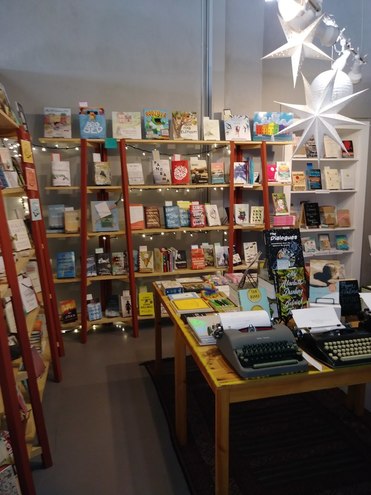 Until I began my journey as a writer, I never fully understood what it took to create a novel. I knew writers had to write them and publishers print and bind them, but I imagined it as a charmed process, with ideas springing to life on the page. Painlessly, seamlessly, in the blink of an eye, there's a book. If you're an author or someone who supports authors, I'll give you a minute to stop laughing before we continue. Done? Okay, let's move on to reality. Most books take years to achieve. First a writer has to learn how to write a good story. That is not a speedy or painless process. Part of that education is writing books. All of them start with an intriguing idea. It may ferment in the author's head for decades before it grows big enough to be a first draft. First drafts take some people months and others, a year or longer to write. And revision, please, lets talk revision. How many drafts is enough? I don't count anymore. My critique group gets my second draft to review. Then I analyze plot and character arcs, map scenes, scribble notes all over the place. Many drafts later, my agent is allowed to see it. Of course, she has suggestions, all of them excellent, for making a better story. Yesterday, after a month or so of brainstorming and revising, I sent my manuscript back to her. I'm waiting for her response. Is it ready to take the next step, be submitted to publishers? Often, I hear books being referred to as babies, birthed on the day they're offered to the public. But I think they're born when they're released from the author's head. My story is now a toddler, taking wobbly steps, hoping to grow into a real book. This is what it looks like today: This is what I hope it grows up to be, a beautiful middle grade book, like my friend Augusta Scattergood's. If you're an aspiring author, I wish you courage and perseverance, and the confidence to believe in your abilities and your books. If you're not a writer, but you love books, I hope you'll treasure them all the more, knowing how hard they worked to reach you.
0 Comments
 I've been querying agents for about eight years. When I started, I kept a hand-written journal, noting the dates and responses I received from my list of carefully researched agents. The last two years, I abandoned my journal for a digital spread sheet. February 12, 2018, I typed the final entry: SIGNED WITH MY AGENT! Ten years learning to write. Four novels queried. Over ninety queries sent. Seventy-one rejections. One offer to represent. The other nineteen agents were informed that I signed with an agent, so I don't know how they would have responded to my work. I've always learned from and been inspired by posts about authors' journeys to acquiring an agent, so I thought I'd share a bit of mine. When I submitted my first book, I had no idea how far I was from being ready. I sent off the requested pages, along with a horrible synopsis. I'm sure it was the easiest rejection of the day for every agent on my list. Was I crushed? Yes, but I moved on. I took online classes, read books on craft, joined two critique groups on top of the one I already belonged to, thinking I'd learn three times faster. And I revised over and over and over again. Five months later, I submitted my first book again, but more cautiously and to fewer agents. I received two requests for partials. Jump for joy, progress! In the end, they all rejected my dear book. So I set it aside, thanking it for all I'd learned. A year or so later, I queried my second book. By this time, I expected the rejections, but they stung just as much. I took my book to workshops and conferences, read more books on craft and listened to critique partners. By the third book, I knew how much I didn't know and was intimidated by how much I had to learn. I considered an MFA, but, given a writer's earning potential and our budget, I couldn't rationalize spending the money. So I plugged along the path. I knew quite a few published authors by now, and it was wonderful to celebrate their new books. It was also growing harder to imagine my books ever sitting next to theirs on a shelf. I learned to write lovely prose and create enticing concepts. Yes, the third book was also rejected when I queried. But two agents said they'd like to see more of my work! And I discovered something crucial in the agents' responses, the weak spot I needed to focus on . . . structure. I needed to learn how to plot. So for my fourth book, I chose a story that would fall apart without a well-conceived plot. Ignoring the urge to create pretty writing, I gave my character a concrete goal and charged towards that goal on an armored-horse with a lance in hand. I worked on that book for almost two years. It won Florida's 2018 Rising Kite contest. I submitted it to agents the week after and was offered representation one week later. Here's what I learned from this journey: Read new books in the age category that's your focus. Read award-winning books. You don't have to analyze them, but become familiar with what kids are reading today, and soak up the way good stories are told. Learn everything you can about writing for children. There are many good books on craft to choose from. Join the Society of Children's Book Writer and Illustrators. Jump on their forum, ask questions and participate in discussions. Attend SCBWI workshops and conferences for motivation, education, networking and opportunities to pitch your book to editors and agents. Find a good critique group. Your local SCBWI chapter can help with that. Critique partners not only help you grow your book, they help with query letters and they're there to support you. Writers understand writers. When you're facing an inbox of rejections, agents can seem like the enemy. They're honestly not. They work weekends and nights, shuffling through massive piles of queries. They give up their days off because they want to find their next client. They want to find stories they love. So, before you send a query, ask yourself if it will shine in that pile of hopeful submissions. Learn what you can from rejections. If an agent responds with a personal comment, read it carefully. Decipher it. Has she said I'm not relating to the character? Study character emotion and how to put that on the page. Did she not connect with the concept? How can you make it more original and dynamic? Perseverance is your best friend. Embrace it. Feed it vitamins. You need it healthy and strong! No two paths are alike. When you start comparing yourself to someone who published their first book after only two years of writing, put blinders on and focus on telling the stories only you can tell. Every book you write teaches you how to write better. There are no wasted efforts, unless you quit. Don't give up!  Mural, Dowtown, St. Petersburg, FL Mural, Dowtown, St. Petersburg, FL Writers invest a lot of time learning their craft. We study books and blogs and attend talks by authors, editors, agents and teachers, all in an effort to write better stories. We hear pretty much the same advice from everyone: Show,Don't Tell Never Open Your Book With A Dream Avoid Backstory Whenever Possible Shun Passive Verbs Balance Dialog, Action and Internality Get Rid Of Adults (for children's writers) We listen. We take their advice to heart. We work to present dramatic stories with dynamic verbs and sparse backstory. We avoid sleeping scenes with even a hint of a dream. Then apologizing to our beloved parents, we kill off the adults. We advise our critique partners to attack every instance that doesn't follow the rules and we slash the offending sections. So, it's with utter dismay that we pick up the latest award-winning novel and discover it opens with a dream and pages and pages of backstory, or the author uses to-be verbs in every other sentence, or most of the story focuses on adults. I used to frown at these books, scratch my head. Fellow writers and I would discuss the mystery. How did these books get published when they break the rules we've been taught? What I've come to understand is that great books tell a great story. Period. Readers don't know the rules and they don't care. And when it comes right down to it, neither do publishers. No doubt, they want writers to know their craft. They want them to write the best book they can with bonus points for beautiful language and style. But compelling story and voice is what sells books. When I was an art student, we were told, learn the rules, then you can break them. So that's my advice to new writers. Study, learn the rules and apply them. Practice, practice, practice. But don't ever let rules get in the way of your creativity. When you write a first draft, kick them out of your head and let the story flow. Focus on what makes your story original. Run wild with its uniqueness. Tell it the way only you can. The rules will be waiting in your handy dandy toolbox when you revise. Apply them with care, where needed. They should always make your story better. If not, put them aside.  Rejection. I do not like that word. It's right up there with Voldemort and Scrooge. Okay, so it doesn't shoot killing spells at baby wizards or sneer at starving orphans, but it does break our hearts. You spend hours perfecting your story or painting. Family and friends applaud your brilliance. Your teachers say it's ready to send out in the world. You submit it to a contest, publisher or art director and as you wait for their response, you try, yes you do, to keep hope from building in your heart. But it's there. That dream of hearing your work has been selected, it's won the prize. When it doesn't, it's hard not to feel defeated. Every time we submit our art to others for review, we face rejection. There can be only one winner. Maybe there are awards for second best and almost good enough. Everyone else is left wondering what the judges thought of their work. It's so easy to go straight from wondering if they liked it at all to thinking they hated it. Don't. Don't give the Scroogey thoughts in your head a voice. They lead to a slippery slope of doubting your work and your ability. Writers and artists have a natural urge to create. Unfortunately, it doesn't come with ego armor. We have to build that bit by bit, and we have to strengthen it often. Like Harry, Ron and Hermione, practice your shielding spells. Every book I write, is created with the hope that someday it will be published. That means submitting each and every one to the publishing world and facing rejection. Here's the thing about publishers: they're people, just like you and me, with different tastes. Some will throw my books in slush piles without a second glance. Some will like them, but not enough. Hopefully, one will love them enough to publish. Unless you hide your art in a closet, it will be viewed and judged by people, and not everyone will love it. I think that's a good thing. I don't want to live in a Voldemort world where everyone likes only Voldemort books and art. There's room in this world for all kinds of art. Yours will find the people who love it. Keep growing through critical feedback, embrace positive reviews and believe in your work. Don't let rejection defeat you. 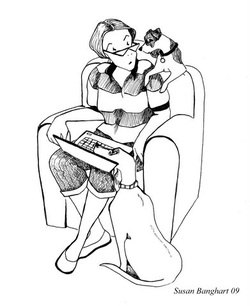 You spent a year or two or ten writing your book, sought feedback from trusted critiques mates and mentors, lost track of the true number of drafts, questioned every word and punctuation mark. You agonized over a synopsis and query letter, erasing again and again until you found the perfect balance of summary and voice. Then, you tackled the agent research. Who is open to submissions? Are they looking for your genre? Have they recently sold a book too similar to yours? Are they reputable? Do they suit you? Slowly, you compiled a list of agents, carefully noting their submission policies. That was me a couple weeks ago, agent list in hand, manuscript and query ready to submit. I chose seven agents to start . One accepted only email queries, one, electronic submission, one asked for three chapters in an attached document and the other four called for query and five to ten sample pages pasted into the body of an email. In this technologically advanced age, it seems silly to waste paper, postage and time mailing bulky printed material. I was thrilled to be a green submitter. Two days later, I would gladly have endured snail mail. Pony Express. Anything other than sending manuscript in the body of an email. I had no trouble pasting my query or downloading my data into the online submission form. But when I tried to paste my ten pages in the email, the formatting was stripped, removing spacing and indents. I won't detail the hours of online research, trying to track down a solution. Or the day I thought I had it figured out, sent emails to the top two agents on my list and later realized the formatting was stripped in transmission. That was a day I'd like to forget. We found a couple online solutions to this problem but none of them worked. SCBWI, The Writer's Market (print version) and literary agencies offer guidelines for formatting print or attached submissions but nothing about email versions. I'm not tech savvy. But my husband works in the IT field and this had him stumped. Near as he could figure, the problem stems from either our internet provider (Verizon) or our email provider (Yahoo) or a combination of both. So the next day, I set up a Gmail account. Using Control c to copy and Control v to paste, I successfully transferred the original Word document, formatting intact. Then I sent my husband a test email and when that came through clean, I submitted my query to the last two agents. Still, I felt I had blown my chance with the agents who received the jumbled mess and it made me sick. Even more troubling, how many innocent writers are sending properly formatted queries, not realizing they may change in transmission? Writers work way too hard at finishing a book to have their chance of publication ruined by a sloppy submission. I understand and respect why the industry calls for emails submissions. But this glitch needs attention. My husband tells me there are so many variables to this problem: internet providers, search engines, email providers, computer, computer programs used to create and save documents, etc. It makes my head hurt. Writers need solid information to ensure they're sending a professional submission and we need that information available through trusted resources. After this experience, my best advice is to always send a trial version of your query to yourself and a trusted friend or family member before you send it to an agent or publisher. And if it's a mess, try another email provider. 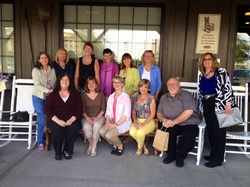 It's been two months since I've blogged. To tell the truth, the blog slipped to some dusty corner of my mind while I typed a thousand words a day, finishing the first draft of a novel. When the book loosened its grip on my mind for a sec, I remembered I had a blog! Now, I'm deep into revising and obsessed with making the story the best it can be. But I thought I'd take a minute to update this site. Since my last post in April, my critique partners have been all kinds of busy. Sandra Markle's picture book Waiting for Ice made Bank Street's Best Children's Books of the Year list, Janet McLaughlin released Psyched Out, the second in her Get Psyched series and Augusta Scattergood's debut novel, Glory Be has won multiple awards, including the prestigious Crystal Kite Award. That's a photo of us above, celebrating Augusta's win last week with other Tampa Bay children's writers. I'm honored to be part of this talented, dedicated group. They deserve credit for my productivity and the growth of my writing. I come away from each critique energized and eager to get home so I can write more story and improve on what they've read. This week, they'll review my synopsis and find the weak points in my plot so I can shore up those places as I revise. In the weeks ahead when this book is ready to submit to agents, they'll be there to keep me sane while I wait for responses. They know the cost of rejection and the value of even the slightest encouragement from an agent or editor. I was motivated recently to join Goodreads so I can review books, including those of my new writer friends. It's a rewarding way to support authors and good books. The more published authors I meet, the more I realize how important these connections are to success. And it isn't all about money or selling our books. It's about sharing our love for children's literature and our desire to create books worthy of a child's bookshelf. Besides polishing my manuscript, another summer goal is to revamp my blog and website. When I created it, I was studying picture books, thinking my art background would translate into that genre. But I learned after two years, that I don't have a picture book voice. I'm not sorry for the experience. Learning is never wasted and I met the most wonderful, talented people. Now, my writing travels a young adult path and I'd like the website to reflect that. I wish you happy writing and encourage you to connect with other writers. If physical connections aren't possible, meet writers online. It will enrich your life and your craft. 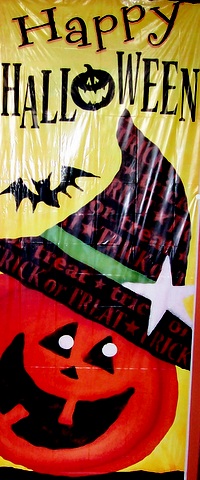 For the next few months, maybe longer, I'll be posting once a month and I celebrate the freedom to do this because . . . I don't have a book to promote! That's right. There are some positives to not having a book deal. At a local SCBWI event, writing coach, Joyce Sweeney, encouraged us nonpubs to embrace this time. Published authors in the room shared knowing glances and smirked. They remember their prebook days with fondness: no agent and publisher prodding you to do backflips and handstands to sell your book; no full calender of signings and school visits; no mad scramble to lure readers on blog, Facebook and Twitter. Joyce offered many sage morsels that day. I sat in a back corner, womanning the sign-in table, and though Joyce couldn't see me, twice her words struck like a bullet. First, she talked of focusing on your sweet spot as a writer. She said often new childrens' writers explore every avenue from picture book to young adult and that's helpful if you use it to find your strengths. Then, it's time to concentrate. If it's PBs, start cranking out stories like a factory. If it's middle grade or YA, write short stories and work your way up to novels. I've been writing for four and a half years and I've juggled PBs, MG and YA for almost the entire journey. I've always felt that my voice is better suited to MG and YA but the artist inside urged me to try PBs. I've been blessed to belong to the best PB group (in my biased opinion) in Florida, Rob Sanders' PB&J, Picture Books and Java. They are my writing family. Perhaps my attachment clouded my reasoning because from the beginning, I've heard: "Your voice is too old for PBs" (my words not there's. They were always much kinder.) So, Joyce's advice hit the target. I needed to quit struggling with PBs and focus on my novels for older children. A small part of me rejoiced, the sensible writer who fought the artist for my attention. A large part of me silently wailed at my inevitable resignation from PB&J. As I recovered from that shock, Joyce addressed branding and how not focusing on one genre can affect new writers. She cited a writer who had a pending deal on a MG novel. The interested agent (or editor, I can't remember which) Googled the writer and up pops a website featuring the author's self-illustrated PBs. The agent wasn't interested in representing PBs so she turned the novel down. Joyce continued, saying agents and publishers want to see an author committed to building devoted readership by producing consistent books. OUCH! I slunk down in my chair, feeling as if a path had cleared from Joyce to my seat and all eyes targeted me. My website is all over the place. I tried to focus it on writing but . . . well, look at it; there's a giant, clothed rabbit hosting the home page! And even though there's only one portfolio page, the art is what viewers notice. No one ever comments on the writing. So, guess who will be revamping their website? One day, I hope to have agents and publishers Googling my name and when they do, I want to be ready. Until then, I'm enjoying my freedom. Today, I don't have to worry about branding or book promoting. The Bible says there's a time for every season. Rejoice fellow nonpubs! This is our season of learning to write the best book we can. Since, I'm only posting once a month, I'm throwing everything I've got here. If you're in Florida, Tennessee or Missouri, please watch for events promoting Rob Sanders' debut PB, Cowboy Christmas. The launch party is Saturday, Nov. 3 at Inkwood Books in Tampa and you don't want to miss it. Rob's hired cowboy strummers and there's sure to be tasty refreshments. Happy Halloween everyone. Wishing you treats, no naughty tricks! A friend recently shared her disappointment over a loved one's lackluster response to a piece of her writing published in a literary journal. I understand her angst. A few years ago, I shared a story I was very proud of with friends and I was bewildered by their reaction. They seemed to have a hard time finishing the story, as if they were bored. Later, when that story won a contest, they asked, "what story was that?" They didn't even remember it.
My writer friend's experience made me wonder why normally kind, considerate people who clearly love us, respond insensitively to our writing. I tried to sit where they sat when they read those stories. First, none of them are writers. They have no idea how much a writer sweats over a piece. They can't envision the excitement at the start of a story, the anxiety waiting for feedback when it's finished and the grueling hours of revision. They haven't watched their email or snail mail for responses to submissions, cried over rejections and squealed when they read: We'd like to buy your story. When non-writers read our work, they compare it to polished, published pieces. And not just any published piece. People read discriminately. They put down what they don't enjoy and tastes vary widely. I have friends who read nothing but non fiction, others who favor only one genre. Most of my friends are older and have no reason to read children's books. So, I imagine when I handed them a story meant for ages eight to twelve, they were also bewildered. How could they connect to a twelve-year-old protagonist's point of view or care that her conflict was successfully resolved in 750 words? I don't share my writing with non-writers anymore unless someone asks (except for my husband, bless him!). It's kinder for all concerned. I do share my successes but I've tempered my expectations. Only writers can fully relate to this journey. This week, my fingers are glued to the keyboard and my mind embedded in novel. (I fought off greedy words, phrases and sentences to get here!) So I'm ushering you to Julianna Baggott's blog where author, Kim Wright guest posted about her experiences with large traditional publishers, small presses and self-publishing. I found it very insightful and more helpful than the usual fare.
And below, some eye candy: Fall foliage taken blocks from my home. Proof Florida does autumn just fine, thank you very much. |
AuthorI write middle grade and young adult books with a magical twist, and I'm represented by the fabulous Leslie Zampetti at Open Book Literary. Writer Websites
Augusta Scattergood Maggie Stiefvater Rob Sanders Fred Koehler JC Kato Sarah Aronson Kelly Barnhill Linda Urban Kate DiCamillo Jacqueline Woodson Helpful Links SCBWI Agent Query Lorin Oberweger - Freelance Editor Search BlogArchives
May 2020
Categories
All
|
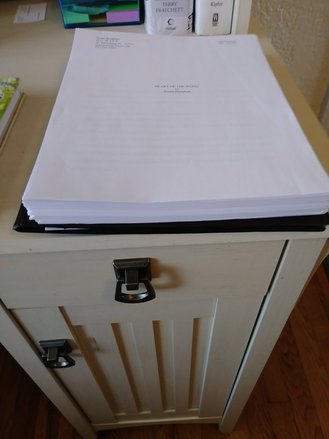
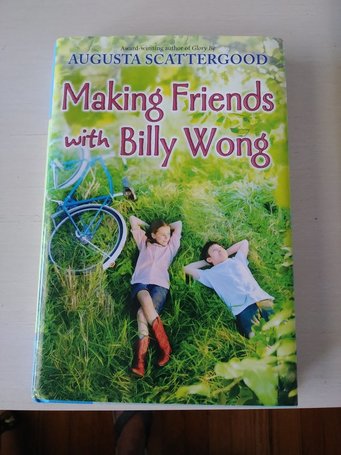

 RSS Feed
RSS Feed
